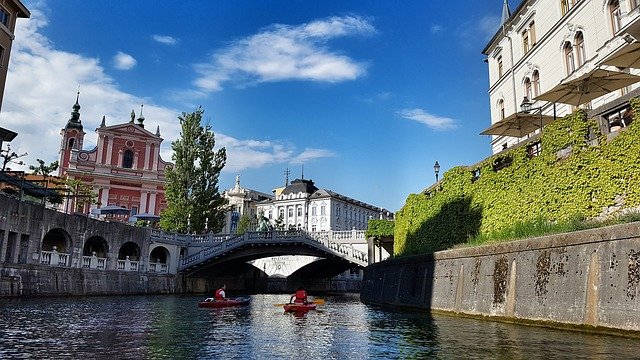
Purchase of real estate in Slovenia by a foreigner: conditions for legal and natural persons
Given that the real estate market is on the rise despite the »corona crisis« and that Slovenia is a small but very culturally and regionally diverse country, with seafront, mountains, forests and lakes, a popular destination for boutique tourism, buying real estate is an interesting investment opportunity. In view of the above, this article presents the main highlights of acquiring real estate in Slovenia and the things foreign buyers need to pay attention to.
The property right of foreigners is primarily regulated by the Constitution of the Republic of Slovenia, which stipulates in Article 68 that foreigners may acquire property rights on real estate under the conditions determined by law or an international treaty ratified by the National Assembly. Foreigners can thus buy real estate in Slovenia and become its owners only if this is allowed by the applicable law or if it follows from an international agreement that binds Slovenia.
- Who can acquire the property right on real estate in Slovenia?
1.1. Foreigners who do not need a decision to establish reciprocity to purchase real estate in Slovenia
The categories of persons, listed in this point, are free to acquire ownership of real estate in Slovenia same as Slovenian citizens and Slovenian legal entities.
The first category, that is free to acquire ownership of real estate in Slovenia are citizens and legal entities of EU, OECD and EFTA Member States. Also, persons with the status of a Slovene without Slovene citizenship can also acquire the right of ownership of real estate without fulfillment of any additional conditions.
Additionally, a foreigner can acquire ownership by inheritance, namely as foreign legal heirs and also as foreign testamentary heirs, those under the condition, that they would be heirs even if it came to inheritance based on the law (i.e., legal heirs).
The last category are foreigners from the former republics of the Socialist Federal Republic of Yugoslavia, who met all the conditions for the registration of property rights into the Land Register, however, the entry was not realized or the registration procedure in the Land Register was not started before 31st of December 1990.
1.2. Foreigners who need a positive decision to establish reciprocity in order to purchase real estate in Slovenia
Citizens of some countries need a special positive decision to establish reciprocity in order to acquire ownership of real estate. This applies to citizens and legal entities of EU candidate countries (Albania, the Republic of Northern Macedonia, Serbia, Montenegro and Turkey). Reciprocity is determined in accordance with the Reciprocity Determination Act. Reciprocity under this Act exists if a citizen of Slovenia or a legal person established in Slovenia can acquire ownership of real estate in a foreign country under the same or similar conditions under which foreigners may acquire ownership of real estate in Slovenia. Additional condition is that it is not significantly more difficult for a citizen of Slovenia or a legal person with a registered office in Slovenia than the fulfillment of conditions for foreigners in the legal order of Slovenia. The existence of reciprocity is determined by the ministry on the basis of the submitted application.
1.3. Foreigners, which do not fall into any of the above-mentioned categories
Citizens or legal entities of other countries, not mentioned in the first two categories, cannot acquire property rights on real estate in Slovenia.
2. What you need to arrange before concluding a contract
2.1. What does a foreign company have to provide to buy real estate in Slovenia?
A foreign legal entity that does not have a registered office or other form of registration in Slovenia must submit an application for entry in the tax register to the financial administration office before purchasing the real estate. At the same time, the responsible person of the foreign company must also be entered in the tax register. The reason for this is that the property owner will become liable to pay taxes related to the property (which includes, for example, compensation for the use of building land). To register a property right in the Land Register, a foreign company also needs an identification number, which is obtained with the registration of foreign legal entities in the Business Register of Slovenia.
2.2. What does a foreign natural person have to arrange to buy real estate?
A natural person who does not have a permanent or temporary residence in Slovenia, but is the owner of taxable immovable property, must submit an application for entry in the tax register to the financial administration office before purchasing the real estate. The foreigner must also submit a request for the determination of the “EMŠO” i.e., identity number, where he must state the reason for the request and attach the relevant evidence to the application.What you need to arrange before concluding a contract
3. Concluding a contract for the sale of real estate in Slovenia
Before concluding the contract, it is necessary to check in the Land Register whether the buyer is actually the owner of the property and obtain a certificate of intended use issued by the municipality in whose area the property is located (unless you are buying part of the building in a condominium). The certificate of intended use is a mandatory attachment to the sales contract, and it will indicate whether the state, municipality or someone else may have a pre-purchase right, whether the land is agricultural and therefore subject to stricter conditions of purchase, etc.
The sale of real estate requires two legal transactions: a purchase contract (on which the ordinary signatures of the contracting parties are sufficient) and a land registry permit (on which the seller’s signature must be notarized). Usually, if the contract does not contain any conditions, the contract itself contains a land registry permit, which makes it necessary to notarize the signature of the seller on the contract itself. In this situation, when both parties sign the contract, the seller will send such contract to financial administration, who will issue the tax assessment decision. Once the tax is paid, the financial administration will return the contract to the seller, together with a certificate that the tax has been paid (in the form of a stamp on the contract). This specific copy of the contract is then taken by the seller to a notary and the seller’s signature on the contract is notarized. On the basis of such a contract, the buyer can be entered in the Land Register as the owner. In order for both parties to insure themselves as much as possible, it is common practice in Slovenia that the notarial retention of the contract is agreed: the seller gives the contract, capable for entry in the Land Register, to the notary with instructions, that the notary can hand the contract over to the buyer or directly proposes the entry of the buyer’s property right in the Land Register, when the buyer proves to the notary that he has paid the purchase price. This also protects the buyer, as the notary is a person of public trust and will hand over the contract to him as soon as the buyer pays the purchase price, so the buyer does not have to worry, that he will pay the purchase price, but the seller would, for some reason, refuse to hand over the contract.
For foreigners, this process can be especially tedious and time consuming (especially if you are acting as the seller). However, a foreign legal or natural person can authorize a Slovenian lawyer to arrange a specific legal transaction – everything from signing the contract, arranging matters with the financial administration and proposing the entry in the Land Register.
4. Applicable tax
Although the foreigner is usually a tax resident of his home country and is not a tax resident of Slovenia, the ownership of the real estate is such a circumstance that he is liable to pay (some) taxes in Slovenia. Below are listed two taxes, which are charged on the sale / purchase of real estate. Some other taxes can be applicable during the ownership of the real estate (e.g., compensation for the use of building land, tax on renting out property, etc.), however, this needs to be examined in the light of the type of property being purchased and it exceeds the scope of this article.
4.1. Real estate transfer tax
Real estate transfer tax is regulated by the Real Property Transaction Tax Act, which states, that the tax is 2% of the agreed sale price and is paid by the seller. Please note, that the seller often tries to pass this tax on to the buyer with a provision in the contract, as it is assumed, that the tax is paid by the seller only if the parties do not agree otherwise.
In some cases, if the seller is a legal person, and if the subject of sale is a new property or the real estate is sold earlier than two years after the first move-in, the transaction is subject to value added tax amounting to 22% (in this case, the real estate transfer tax is not charged).
4.2. Capital gains tax
Capital gains tax is also a tax that must be paid by the seller in certain cases. Capital gains are taxable, if they derive from the sale of immovable property prior to expiration of the 20-year period from the purchase of this immovable property. Capital gains are taxed at a 27.5 % tax rate. The tax rate is reduced each 5 years of holding period (27.5 % for the first 5 years of holding period; 20 % for holding period 5 to 10 years, 15 % for holding period 10 to 15 years, 10 % for holding period 15 to 20 years, 0 % after 20 years holding period). Consequently, any gains are exempt after a 20-year holding period.
The tax base on capital gains is the difference between the value of capital at disposal and the value of capital at acquisition. When the difference between the value of capital at disposal and the value of capital at acquisition is positive, the final tax base is determined as the difference additionally reduced by the standard costs associated with the acquisition and disposal of capital.
Conclusion
To conclude, when a foreigner is interest in buying real estate in Slovenia, it is advisable to seek advice with the local law office, since this will help ensure a smooth realization of the acquisition of the right of ownership. Namely, it is a relatively complicated transaction, as several laws from differences areas are applicable to it, and the cooperation of several state bodies is required. If the contract or more specifically the land registry permit is not drawn up correctly (which is often the case if the contract is prepared by the seller himself, who is not a lawyer), the court may refuse to register the buyer’s ownership right in the land registry. Since the entry in the Land Register is of a constitutive and not just a declaratory nature (i.e., the buyer acquires the right of ownership only when he is entry in the Land Register), this can pose a major problem for the buyer.
Questions regarding Slovenian business law or real estate law? We are happy to assist you with our partner:




